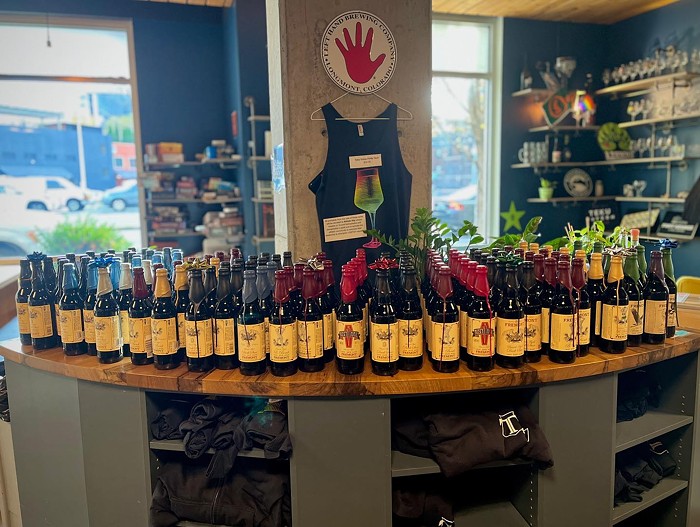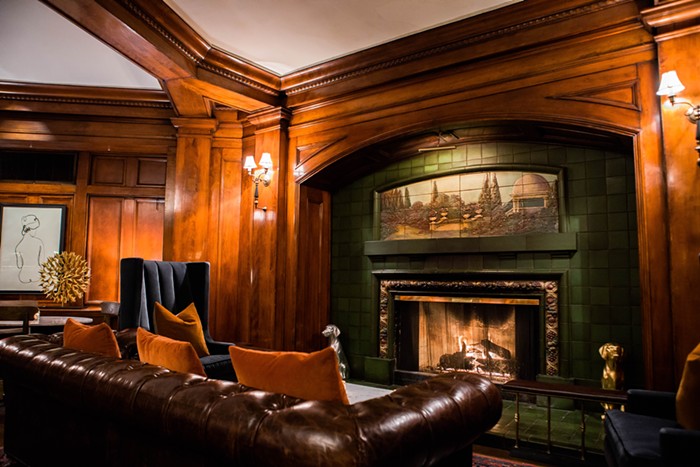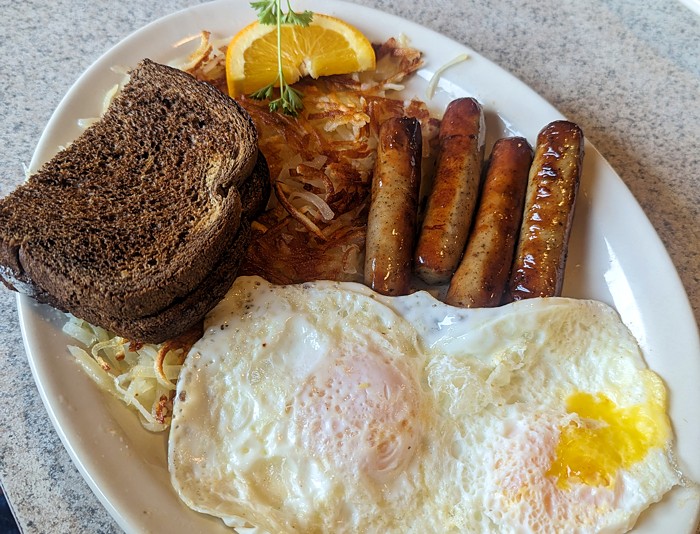When the light rail extension opens this weekend, much of the excitement will focus on how public transportation now whisks Seattleites north, quickly depositing them in the heart of bustling Capitol Hill or near the athletic and academic halls of the University of Washington. But since it began running in 2009, light rail always traveled south from downtown. And not just to Sea-Tac Airport, but to some of Seattle's most diverse—and delicious—neighborhoods in Rainier Valley.
Residents of Capitol Hill may have easy access to innumerable bowls of phố and late-night tacos, but now, thanks to light rail, they can also slurp bowls of mì bò kho and bún bò hu, or plow through plates of cochinita pibil. These dishes—and many, many more—can be found just steps away from the Othello Station on Martin Luther King Jr. Way South.
The west side of MLK that runs parallel to the light rail tracks is a nondescript block filled with businesses whose windows look a little dark and unwelcoming. But step inside Hoàng Lan or Cafe Hương Quê, and you'll be greeted by warm atmospheres and shiny faux-marble and granite tabletops. The specialty at Hoàng Lan is bún bò hu, a hearty soup whose spicy, lemongrass-tinged broth is filled with thick rice noodles. The broth here is so rich, it's almost milky, and it comes loaded with an assortment of meat: pork meatballs with black pepper, dark cubes of pork blood, long slippery slices of beef tendon, and, the crown jewel, a big ol' pork knuckle—soft, gelatinous meat wrapped around an intrusive hunk of bone that sits in the middle of the bowl just waiting to be picked up and gnawed on.
But my favorite part of Hoàng Lan's bún bò hu is actually something that comes with it: slices of raw banana blossom—beautiful purple curlicues that come stacked on a plate along with lime, bean sprouts, and shredded cabbage. Along with being lovely, the banana flower adds a fresh, vegetal crunch.
Cafe Hương Quê makes a lovely hủ tiếu nam vang, a clear pork broth filled with rice noodles, roasted pork, fish balls, and liver, and sprinkled with crunchy fried shallots. But the restaurant's most satisfying dish is mì bò kho; eating it feels like you're drinking a bowl of pot roast. Hunks of silky, braised beef—shot through with flavors of star anise, cinnamon, sugar, and fish sauce—and thin wheat noodles swim in a viscous brown broth dotted with chunks of sweet carrot. A scattering of fresh, whole basil leaves gives life and brightness.
Kitty-corner from the light rail stop is The Station at Othello Park, a luxury apartment building that opened in 2011. It's home to a fitness center, a rooftop deck called SKYDECK 360, and studio apartments that begin at $1,100 a month. (Even if the neighborhood's longtime residents, mostly lower-income people of color, wanted to rent apartments here, they might find themselves out of luck. A fair-housing test conducted by the city in 2014 measuring treatment of potential renters in four categories—race, national origin, sexual orientation and gender identity—resulted in the Seattle Office for Civil Rights filing charges of housing discrimination against The Station.)
On a happier note, the building is also home to Huarachitos, Jose Luis Pantiga-Flores and Ana Martinez's excellent Mexican restaurant. Huarachitos is beloved for its namesake huaraches—thick, hand-formed, oval-shaped tortilla "sandals"—stuffed with layers of beans, drenched in salsa, and topped with cheese, vegetables, and various meats. But I am forever drawn to its cochinita pibil, a Yucatecan specialty of pork marinated in oregano, cumin, cinnamon, achiote, and citrus, then wrapped in banana leaves and slow-roasted. The tender meat collapses at a fork's slightest touch, its fat cut by pickled habanero-spiced red onions—bracingly tart and hot.
If you head west from the north end of the Othello stop, you'll find yourself in the middle of King Plaza (7101 Martin Luther King Jr. Way S), which is home to more than 30 businesses, including a chiropractor, a dentist, a pharmacy, a laundromat, and a seafood market. The plaza is so big, it actually spans two buildings on either side of South Myrtle Street.
You could spend years eating the full menu of excellent banh mi at Tammy's Deli and Bakery, while simultaneously stalking the offerings on its stainless-steel tables. On any given day, piles of Styrofoam and plastic trays hold grilled meatballs, translucent, dumpling-like objects, and blocks of striped, brilliant-colored jellies—all gleaming under the fluorescent lights. Nearby, Foo Lam serves excellent dim sum daily. I especially love the deep-fried taro nests—crunchy, frizzled outer shells that split open to reveal a custardy, lavender-colored filling studded with ground pork.
But that's just the beginning: You can also have phố at Phố My Châu, pounds of Louisiana crawfish (or gulf shrimp, clams, mussels, and crab) that you eat messily by hand at the Cajun Crawfish, or bubble tea and smoothies at Ambrosia Cafe. If you're looking for something sweet, pop into Che Dessert Lounge, home to a dizzying arena of Vietnamese and other Asian treats: durian-and-cream crepes, winter melon and gooseberry candies, and sweet soups made with ingredients such as black-eyed peas, sticky rice, broad beans, and yam. You might even try guilinggao with snow fungus and longan, a traditional Chinese medicinal jelly dessert. Guilinggao is made from a powder of dried, aged turtle shells and is said to help reduce fatigue and flush toxins from the body.
Turtle jelly is just one of the many discoveries you can make around Othello. The other day, I was walking around King Plaza and stopped into Olympic Express, a restaurant that serves halal Asian cuisine. I got to talking with Suaidy Les, whose father, Abdulnaser Abdulmalik, started the restaurant in 1992. Abdulmalik was King Plaza's first tenant.
At first glance, Olympic Express seems like one of Seattle's many pan-Asian teriyaki joints: The menu has teriyaki, pad thai, phố, Thai curry, and Chinese-style stir-fries. But look more closely, and you'll also find Malaysian lamb curry, samusas, a gyro sandwich, and, improbably, gyro fried rice. I noticed the beautiful artwork on the pristine walls: white mosques on blue backgrounds with sparkling Arabic script.
When I asked Les where his family was from, he explained that his family is Cham, an ethnic group whose ancestors once held vast lands throughout Central Vietnam, Cambodia, and Laos from the 6th through 15th centuries. In the early 19th century, the Cham were violently driven from their home by the Vietnamese government, and, without a country to call home, scattered throughout Southeast Asia to Cambodia, Thailand, China, and Malaysia.
As I waited for my lamb steak—a simple but beautifully grilled piece of thin meat that was cut into slices, doused in a savory brown sauce, and served with fried rice and a salad of iceberg wedges in a creamy, slightly sweet dressing—Les explained that the Cham practiced Hinduism, but many, like his family, later converted to Islam. After his father opened Olympic Express as a teriyaki restaurant, he realized that he could also feed the local Muslim community, whose diets were underserved by restaurants that did not follow Islamic dietary laws. Though Olympic Express has always had a steady stream of customers, including Cham, Vietnamese, Thai, and Chinese people, by serving halal meats, it's become a fixture for Somali and other East African diners.
Over the last 25 years, Les says that he's seen a lot of changes in the neighborhood, including the arrival of light rail. Overall, he says the changes have been positive—less violence, more foot traffic, new customers. One other thing he's noticed about diners who come in now?
"They're more diverse."
From March 25 to April 10, several of the restaurants mentioned here—Foo Lam, Huarachitos, and Olympic Express—as well as many others located within walking distance of the Mount Baker, Columbia City, and Othello light rail stations, are participating in Plate of Nations, a two-week event put on by the MLK Business Association. The restaurants will offer special menus, priced at $15 and $25, that are designed to be shared.



















